
On the 25th of June 2018, the “La Pira, Advocator for Peace, Crusader for China†exhibition Opening Ceremony took place at the Saint Paul School Hall. With the presence of our school community and followed live by our parents and school friends, Giorgio La Pira was remembered and honored.
The opening ceremony was graced with the presence of the special guests Doctor Alexis Tam, Secretariat for Social Affairs and Culture; Father Manuel Antonio Silva Machado, Chancellor of the Macau Dioceses; Ms Xu Ting, Minister of Culture and Education of China Liaison Office in Macau; Mr Lo Pak San, Director of the Education and Youth Affairs Bureau; Monsignor Ante Jozic, Head of the Holy See Study Mission in Hong Kong; Ms Vicky Leong, Sub-Director of Education and Youth Affairs Bureau and Fr. Bonifacio Garcia Solis, Provincial of the Rosary Province.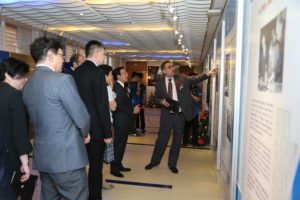
The event took place within the “framework of the approaching fiftieth anniversary of the start of the diplomatic relations between the Italian Republic and the People’s Republic of China and to recover the figure of a man who worked on the civil cultural plan for the consolidation of International peace and the recognition of the People Republic of China by the International Community and as a permanent member in the UN Security Council†the school Principal stated.
Extracted from the video of La Pira’s life and works, shown during the ceremony, Giorgio La Pira was born in Pozzallo, in south-eastern Sicily, in the heart of the Mediterranean Sea, January 9, 1904. After his Primary education in Pozzallo and Messina, he attended the ‘ Antonello’ and the ‘A. M. Jaci’ technical-commercial colleges and graduated in accounting and commerce. After obtaining his degree in Law he moved to Florence where he attained the chair or Roman Law in 1934.
La Pira was a prominent Italian politician. His work as mayor of Florence is punctuated by noteworthy administrative achievements and extraordinary political and social initiatives. Not only for the reconstruction of Italy after the fascist dictatorship and the disastrous outcomes of World War, but he also tireless defended, through the magazine ’Principi’ and the drafting of the ’fundamental Principles’  of the Constitution of Italy, the value of the human person, the universal right to work and freedom setting the Christian premises for authentic democracy.
La Pira’s commitment toward the People’s Republic of China was intense Unknown to many, La Pira was also the key player for the bishops of China to take part in the Second Vatican Council and the main supporter for the full integration of China into the International Community starting with recognizing the right to take part, as a permanent member with veto power, in the UN.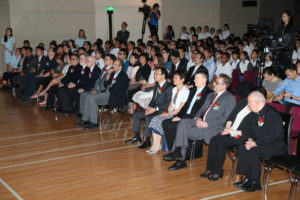
On Saturday 5 November 1977 La Pira passed away in the Clinic of the English Sisters in via Cherubini in Florence “and on 9 January 1986, the 82nd anniversary of La Pira’s birth Cardinal Silvano Piovanelli, Archbishop of Florence opened the diocesan process for his beatification in the Dominican Basilica of St. Mark, place where he lived, during his post as a mayor, as a member of the third order of the Dominicans Friars.
“I am glad that with the help of Mr Mario Primiceiro, President of the Foundation Giorgio La Pira and Mr. Giulio Conticelli and of course all the members of the school community who have been involved in this event we remember and pay honour to a politician, a man of the world and a man of God, whose process of beatification is on course†the school Principal said in his speech.
Likewise, Monsignor Ante in his speech emphasized the special role La Pira played during his life, not only in Florence and Italy but in the whole world as a promoter for peace and protector of the poor; message that was consolidated by Father Manuel Matchado during his blessing when he said that one of the lessons we can learn from La Pira today is that each one has a mission and we must have the courage to carry it out up to the very end no matter the obstacles we may come across.
After the beautiful mixed-East -West musical performance by our primary student Sung Ga Wai, the guests visited with admiration the exhibit of La Pira’s life and works at the Saint Paul School Fra Angelico exhibition gallery.
According to the School Principal, the exhibition will remain open for visits from Monday to Friday from 10:00 to 17:00 hours until 25 July 2018.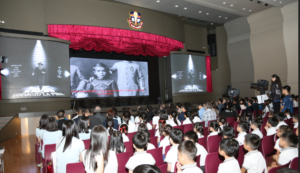
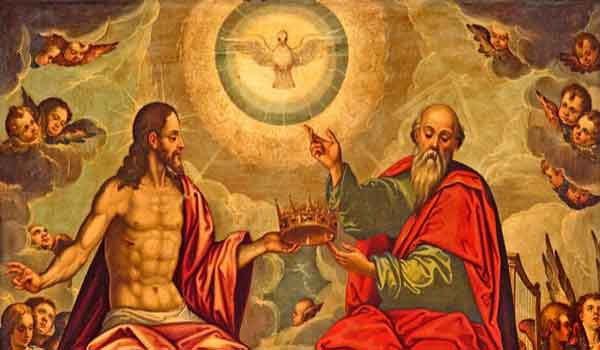
We celebrate today the Solemnity of the Most Blessed Trinity, or Trinity Sunday, which is the central mystery of our Christian faith. From the beginning of Christianity, the Trinity is always invoked very frequently – in prayer.
We have just proclaimed the Word of God, what does it tell us?
First Reading: Dt 4:32-34, 39-40. In the Old Testament God is not yet revealed explicitly as Trinity but as the One anima the One who is merciful and gracious! “The Lord, the Lord, a merciful and gracious God, slow to anger and rich in kindness and fidelity. Second Reading: Rom 8:14-17. Paul tells us that we are adopted children of God One and Triune. We remember what Jesus, with the power of the Holy Spirit, continues telling us: If you love me, you will keep my word, and my Father and I will come to you, and make our home in you.
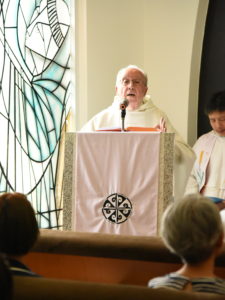 The Holy Gospel: Mt 28:16-20. After his resurrection and just before his ascension into heaven, Jesus gives to his disciples a mission, a universal mission to which all the disciples are called to do: God therefore and make disciples of all nations baptizing them in the name of the Father, and of the Son and of the Holy Spirit, and teaching them to observe all that I have commended your.
The Holy Gospel: Mt 28:16-20. After his resurrection and just before his ascension into heaven, Jesus gives to his disciples a mission, a universal mission to which all the disciples are called to do: God therefore and make disciples of all nations baptizing them in the name of the Father, and of the Son and of the Holy Spirit, and teaching them to observe all that I have commended your.
The Mystery of the Blessed Trinity is revealed in – among other events – the Baptism of Jesus in the Jordan: the Father speaks, You are my beloved Son the Holy Spirit descends upon him in the form of a dove; the Son of God is baptized by John the Baptist (cf. Mk 1:7-11).
Our God is One and Triune. He is One God and Three different Persons (we say In the name of the Father and of the Son and of the Holy Spirit and not in the names of the Father, Son and Holy Spirit). One God: absolute unity and absolute equality. And Three Persons: real distinct relations among the Three: of the Father to the Son (paternity), and of the Son to the Father (filiation), and of the Father and the Son to the Holy Spirit (love). And Three different Persons, or three different faces of the same God; or three caresses of love; or one love and three lovers; or one fountain without beginning and end with three rivers in the same water.
Who is God? God for us Christians is Father, Son and Holy Spirit.
God the Father is the first divine Person of the Blessed Trinity. He is our Creator and our Father: the Father of the prodigal son and of the lost sheep who loves us, who forgives us. We are God children. Before ascending into heaven, Jesus tell his diciples: “I am going to my Father and your Father.
God the Son is the second divine Person of the Blessed Trinity. He reveals to us God as Father and sends to his disciples we are certainly included – the Holy Spirit, the Spirit of the Father and the Son. He is Jesus Christ, God and Man, our Savior and Redeemer. He is the Way we have to follow, the Truth we have to know and communicate to others, and the Life we have to live life centered on love of God, and of all neighbors, and of the poor and needy neighbors in particular. Christ is our brother, and in him we are each other brother and sister.
God the Holy Spirit is the third divine Person of the Blessed Trinity, the Love of the Father and the Son, God gift to us his divine Grace. The Holy Spirit is our advocate and consoler. He dwells in us with the Father and the Son (the incredible indwelling of the Blessed Trinity!).
Our God is not a solitary or lonely God. We proclaim: The true God is One in Trinity, and a Trinity in One.†Our dear God, One and Triune, is communion and a constant invitation to us to pray together, and to live in the communion of love.
The Holy Trinity is a constant presence in our life. We were baptized In the name of the Father and of the Son and of the Holy Spirit. We often make the Sign of the Cross In the name of the Father and of the Son and of the Holy Spirit. We end the recitation of the Psalms, of the Mysteries of the Rosary, and of our prayers with the Glory be to the Father and to the Son and to the Holy Spirit. The priest addresses all our community prayers to the Father, through the Son, in the Holy Spirit.
We are Christians, and happy to be so! Who is a Christian? He or she who is baptized in the name of the Father and of the Son and of the Holy Spirit, and is faithful to his or her baptism: a person who knows God as Father, confesses Jesus as the Son of God and the Man-for-Others, and experiences the Holy Spirit who tells women and men believers that Jesus is alive; that we are called to live in him, and that outside him there is darkness (O. Gonzalez de Cardedal).
As we Christians celebrate the great Solemnity of the Blessed Trinity after the season of Easter that ended with Pentecost, we are asked to examine our faith and devotion to the Blessed Trinity. We are urged to check up in our soul the primordial Trinitarian attitude in our life: the filial attitude – we are children of God; the fraternal attitude – we are brothers and sisters of Christ and in Christ of one another; and our charismatic attitude – we are people transformed by the grace and love of the Holy Spirit, and joyful and courageous witnesses of the death and resurrection of Christ, that tell the world of his love.
When all is said the little we may say on the Blessed Trinity -; when all is said, we have to conclude with what we all know: The mystery of the Blessed Trinity is the unfathomable, the awesome mystery of the Blessed Trinity! Thanks to God gift of faith, we believe, that is, we see like through a glass darkly. We cannot understand, but we believe in God who reveals himself to us as One and Triune. The deep mystery may be unveiled little by little – always very imperfectly by living our faith in love. It is clearly so in the lives of the saints and the mystics. St. Columbanus says something beautiful: The invisible God is partly seen by a heart that is pure. Therefore the monk adds -, seek the supreme wisdom, not by verbal debate but by the perfection of a good life; not with the tongue, but with the faith which issues from singleness of heart (Instruction I, On Faith, 3-5).
Let me close with a lovely anecdote I heard to Cardinal Bo of Myanmar, when he pronounced the keynote lecture of the Theology Week of the University of Santo Tomas, Manila, last March 2018. There was a bishop who had to cross the seashore to go to his ministry. One day he saw three fishermen who rushed to him to tell him proudly and joyfully: Bishop, we are Catholics. The Bishop asked them: Do you pray? Yes, every day. How do you pray? With raised hands up to heaven, we say: You Three are there; we three are here, have mercy on us. The good Bishop loved them and told them that they should learn the Our Father, and taught it to them very patiently. Two weeks later, the bishop crossed the seashore again. He asked the three fishermen: Do you pray the Our Father? No, Bishop, we forgot it. The Bishop told them: Your prayer is fine; it is also my prayer. The four raised up their hands to heaven and prayed: You Three are there; we four are here, have mercy on us.
Father, Son and Holy Spirit: You Three are there, we all are here, have mercy on us. Amen
(Fausto Gomez OP. St. Dominic Priory. Macau, May 27, 2018)
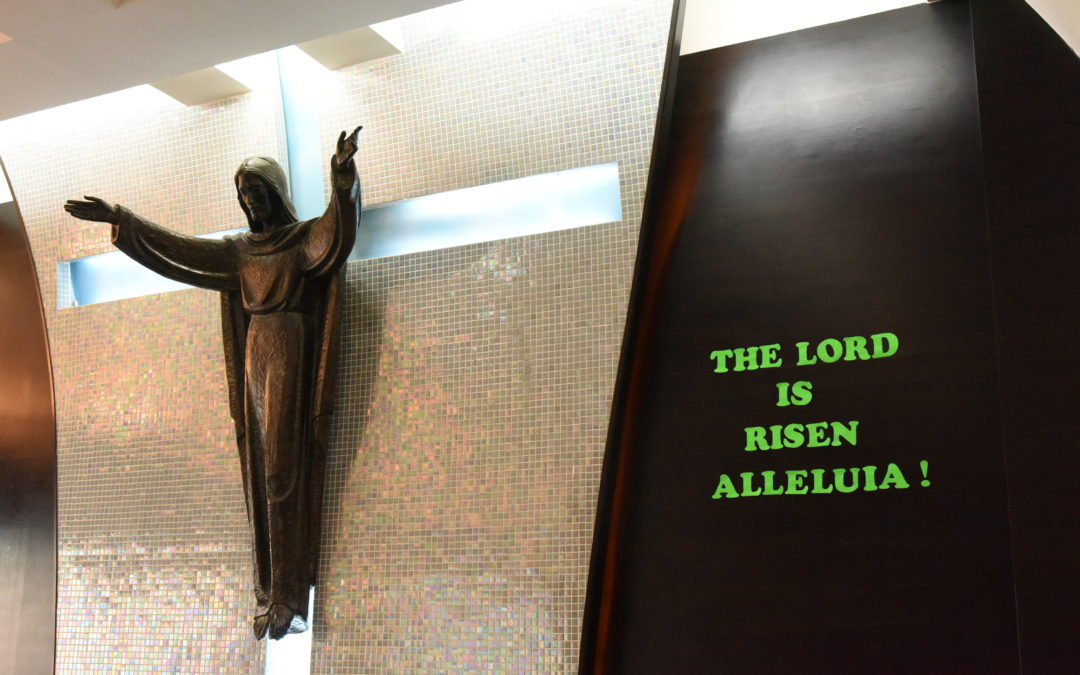
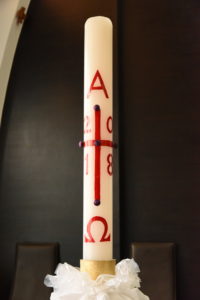
We are celebrating Easter, the joyful day of the Resurrection of our Lord Jesus Christ and of our own coming resurrection. St Paul tells us that God, who raised up the Lord, will raise us also by his power (1 Cor 6:14; Col 3:1-4), and, in the Second Reading (Col 3:1-9), that because in Christ we are raised, let us look therefore for the values above, that is, the values of the Kingdom of God – dignity, justice, solidarity, prayer, compassion, forgiveness and joy.
In the First Reading (cf. Acts 10:34, 37-43), Peter proclaims the central content of apostolic preaching, the Jesus event: The Lord suffered, died, was raised – and lives! And in the Holy Gospel (Jn 20:1-9), John speaks of the empty tomb: the tomb where Christ was buried is empty; He is not there. And John believed. Look at the Risen Lord – St. Teresa of Avila writes -, Look at the Risen Lord; just to imagine how He came out of the tomb is reason for joy; with what clarity, with what beauty and majesty; so victorious and joyful.
After his Resurrection, Jesus appeared to the disciples about ten times. The apostles reluctantly accepted the resurrection of Christ: that the Risen Lord was the same crucified Lord gloriously transfigured but the same Jesus. Once they accepted it fully, what an unimaginable change! Every Easter I am deeply moved by the attitude of Jesus disciples after the Resurrection and the Pentecost experience. Two qualities adorn their lives: the joy of their faith in the Crucified and Risen Lord, and their courage facing persecution for his sake.
Indeed, there is great joy in the presence of the Risen Lord. Mary, Our Lady rejoices (cf. Lk 1: 46-47). I believe with others, including St. Vincent Ferrer that the first appearance of the Lord after his Resurrection on Easter Sunday was to Mary, his Mother.
The first disciples were glad for having had the honor of suffering humiliation for the sake of the name (Ac 5:41). What name? Jesus the Crucified and Risen Lord! The converts of Paul and Barnabas were filled with joy and the Holy Spirit (Ac 13:51). After baptizing the Ethiopian eunuch, Philip was snatched away by the Spirit and disappeared, but the eunuch continued on his way rejoicing (Ac 8:39). The jailer of Paul and Silas in Philippi rejoiced with his whole household after having received the gift of faith in God (cf. Ac 16:34). Following the apostles and the disciples of Jesus through the ages, we believe in Christ resurrection, which is pure joy to the world, joy to you and me! Understandably, all the saints are happy and joyful; “the greatest of their gifts was their smile. We all long for happiness, and joy is the daughter of happiness (Fray Luis de Granada); and the smile, an easily recognizable joyful expression.
Joy, a passion and an emotion of the human person, stands for true satisfaction and delight; for the gladness produced by goodness, beauty, God. Joy is one of the fruits and blessings of the Holy Spirit (Gal 5:22). With the Psalmist, we believers rejoice coming to the house of God for worship and communion: What a joy when they told me, Let us go to the house of the Lord,†“to the God of my jo (Ps 122:1, and 43:4), in whose presence “there is fullness of joy (Ps 16:11).
The core of Jesus preaching is the Beatitudes, which are eight forms of happiness so different from the beatitudes of the world (to be rich, powerful, to enjoy inordinate pleasures. Our Beatitudes: Happy are the poor in spirit, the merciful, the peacemakers, those persecuted and even those who mourn! Therefore, Jesus tells us, Be glad and rejoice (Mt 5:12). After appearing to the disciples, with doubting Thomas among them this second time, Jesus says: Happy are those who believe, although they do not see(Jn 20:29). This is called by some the ninth beatitude, also our ninth Beatitude (cf. Martin Descalzo, III, 405). For each one of us, the reason for our belief in the resurrection of Christ is our faith, God great and unmerited gift to us.
How did the first Christian communities experience Christ’s Resurrection? By being faithful and hopeful
and passionately and joyfully in love with the Crucified and Risen Lord: They remained faithful to the teaching of the apostles, to fraternity, to the breaking of the bread, and to prayer They shared their food gladly and generously; they praised God and were looked up to by everyone (Ac, 2:42, 46-47). Through Easter and life -, St. Augustine invites us to sing together: When many rejoice together, the joy of each is richer.And he adds: “ we sing together to the Risen Lord, and try to make sure that our life sings the same tune as our mouth.
 On the way back to Emmaus the two disciples are sad. They have a reason to be sad: they believe Jesus is dead. What is bad is that those who believe that Jesus rose from the dead are sad (J. L. Martin Descalzo). Christians who are sad, Bonhoeffer says, have not understood the Resurrection, the joy of the resurrection! It is impossible to be sad in the presence of the Risen Lord (Schillebeeckx). No wonder, the monk and theologian Evagrius Ponticus (4th century) added, to the traditional seven capital sins, the eighth capital sin, which is sadness.
On the way back to Emmaus the two disciples are sad. They have a reason to be sad: they believe Jesus is dead. What is bad is that those who believe that Jesus rose from the dead are sad (J. L. Martin Descalzo). Christians who are sad, Bonhoeffer says, have not understood the Resurrection, the joy of the resurrection! It is impossible to be sad in the presence of the Risen Lord (Schillebeeckx). No wonder, the monk and theologian Evagrius Ponticus (4th century) added, to the traditional seven capital sins, the eighth capital sin, which is sadness.
How we, believers in Jesus, may not be joyful? We believe that God is our Father, Jesus is our savior and brother, and the Holy Spirit, our advocate and consoler. We have faith in the indwelling of the Blessed Trinity in our souls. Someone has said: No one is as happy as an authentic Christian (Pascal), or – we may add – as an authentic believer or an authentic human being! This is the reason why – some of our brothers and sisters – add to the Ten Commandments, the eleventh commandment: Be joyful (Joseph Luis Martin Descalzo).
What is the main cause of Christian joy? True love faithful and hopeful love – is the main source of real happiness and joy. Love is joyful. Indeed charity or love of God and of all neighbors – causes real joy: Joy is, with peace and mercy, an effect attached to charity.
You and I ask: But why should we poor sinners be joyful? We all are sinners and sin is darkness! But Jesus keeps calling you and me to conversion, which is permeated by joy – joy in the sinner, in the community, and in heaven: “I tell you, there will be more rejoicing in heaven over one repentant sinner than over ninety-nine upright people who have no need of repentance (Lk 15:10). In spite of our sins, God our Father loves us, and Jesus heals us, and the Holy Spirit strengthens us!
How may we be joyful when suffering comes to hurt us? Suffering is part of our life, and we all know this very well: we all carry our own personal cross. But suffering is not opposed to joy. The key word that gives meaning to our life is love. And love – only love – can make suffering bearable, light, and, yes, even joyful. Disciples of Jesus through the centuries – even when persecuted and martyred – were and are full of joy (Ac 5:41). The saints, all joyful people, speak of their many sufferings and pains as of sweet wounds! Love and hope makes theirs sufferings and ours a path of true joy.
Hope, the theological virtue of faithful and loving hope, makes us long for eternal life. Theological hope is permeated by joy. St. Paul advises us: Be joyful in hope (Rom 12:12). We are pilgrims on the way to our Fathers house and certainly tomorrow will be better! We joyfully hope and pray that at the end of our earthly pilgrimage, Jesus will tell: Come, share your master joy (Mt 25:21-23). Meanwhile, on the journey of our life, we try hard to be joyful for through his death and resurrection, Jesus turned sunset into sunrise (Clement of Rome).
Therefore, my sisters and my brothers, our attitude and outlook on life ought to be joyful. Yes I know: we have to be careful and not speak romantically of the cross carrying our cross hurts! Indeed, here and there we will encounter punctual sadness; but, hopefully, not as a bad habit or a firm disposition in the soul, but as a passing storm – or of many storms – that may be turned, thanks to God grace, into a path of joyful love! There are situations in life that we cannot change, but we may face them differently limping, perhaps -, but patiently, obediently, and even joyfully. On Palm Sunday, Holy Thursday and Good Friday, we saw Jesus sad – at Mount of Olives and on the Cross: He felt deeply abandoned by God, who kept totally silent. As he himself was suffering terribly, St. Paul advises us: Let us not rely on ourselves but “on God who raises the dead (I Cor 1:9), and makes of our cross a victorious and hopeful cross. Thus, we are Easter People!
How wonderful! We are Easter People and Alleluia is our song!
HAPPY EASTER! May the people around us notice that we believe in the resurrection of the Lord by the way we treat them with joyful kindness and compassion. In a special way today the day of days -, we praise the Lord and we give him thanks! Amen, Alleluia!
Fausto Gomez OP
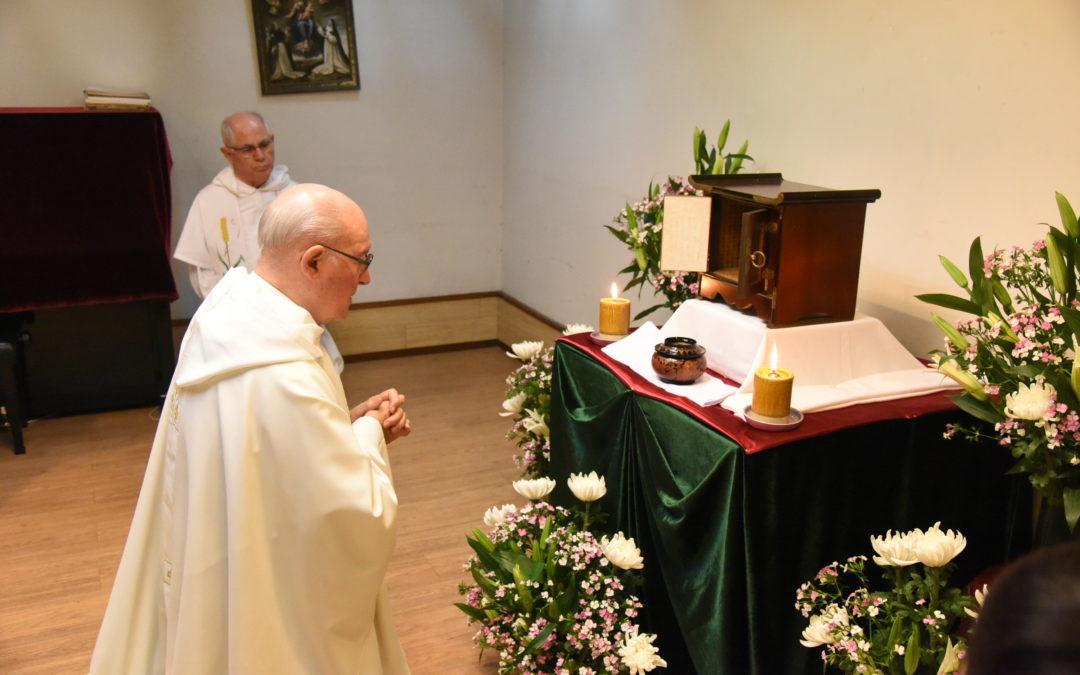
-The Mass of the Lord Supper we are celebrating, plunges us into the drama of the final moments of Jesus earthly journey. You can feel the tension of this hour of which John speaks in his Gospel. It is a sobering, even frightening time when danger lurks on the horizon.
-Today gospel reading is all about love: love given, love received, love enjoined. On the solemn moment of the eve of his death, Jesus did what every human being does on the point of death: he centered on the essential.
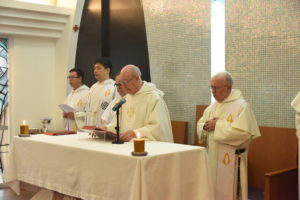
On that night when he was going to be delivered, Jesus made an unusual gesture: he rose from the table, distancing himself from the place reserved for those who preside, and placed himself in the position of those who, then and now, belong to the category of “those who serve”, the place of one of many. The essential for Jesus was his love for all, especially those who needed Him most. From that place, that of “one of many”, he saw near and inside those whom others considered far and away and, on the other hand, those at the to turned out to be below. Because for him the most, thebiggest and the most importantwere those that in our eyes are less.
– The gesture of Jesus, washing the feet to his disciples task reserved exclusively for slaves- is the prelude of his passion and the key of interpretation: Jesus passion is essentially a service of love to the extreme: He loved his own in the world, and He loved them to the end (Jn 13, 1-15).
The washing the disciples feet symbolizes the ultimate service Jesus is about to give to them by giving up his life on the cross. It serves also as a model for how the disciples, you and I, are to love one another.
The action itself is startling, since Jesus is the Messiah and Son of God. It should be the disciples who wash Jesus feet as a sign of humility, faithfulness, and love. He reverses that process, and Peter immediately objects. His objection makes sense, and he probably was speaking for the whole group.
After Jesus has finished washing his disciples feet, he asks them directly if they realize what he has done for them. In fact, Jesus has given them a model for what it means to be one of his followers. It means to serve one another in radical forms of love. It means to wash one another feet.
Later on, Jesus will refer to this kind of love as a new commandment. It is new in that it demands radical equality among the disciples and the ones they serve. This was symbolized by Jesus when he came down from his chair, took off his robe, and tied a towel around his waist. He became one with the people he was about to serve. And what he did for them, they are, we are, to do for one another.
The Risen Christ, who shared this meal on the eve of his own passion, hosts us and serves us each time we gather to celebrate the Eucharist. As people of the Eucharist, you and I are also called to be people of the basin and towel. We are invited to emulate this Jesus through lives of loving service to others. We are called to wash the feet of one another.
Bread and wine, basin and towel. These symbols are at the very center of our identity as followers of Jesus. They represent an ongoing challenge. They are countercultural because they challenge the “Me First mentality that often prevails in our society.
One of the greatest gifts Jesus gave to us is dramatically evident in today Gospel. In the washing of feet, Jesus teaches us how to serve.
– Not satisfied with this, He still thinks on his disciples, on all of us, and institutes the Eucharist, for He wants to stay with them forever and offers himself not without a great scandal for many of his Jewish listeners, as food to eat, blood to quench their thirst of life, and as a guarantee of eternal life for those who truly believe in him.
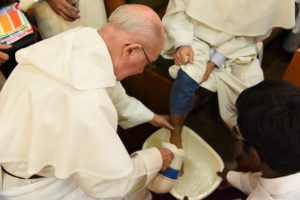 -Jesus institutes, besides, the Priesthood, so that they will have always somebody who, in His name, will take, bless, break and distribute this bread and wine to them, wipe out their sins, and sometimes their tears, too, and remind them that, -as St. John of the Cross said-,at the sunset of life, you will be judged on love but, above all, we should not forget, we will be judged by Love Itself.
-Jesus institutes, besides, the Priesthood, so that they will have always somebody who, in His name, will take, bless, break and distribute this bread and wine to them, wipe out their sins, and sometimes their tears, too, and remind them that, -as St. John of the Cross said-,at the sunset of life, you will be judged on love but, above all, we should not forget, we will be judged by Love Itself.
- The washing of the feet is, then: 1) a revelation; it is not a queer occurrence of the moment, or a superficiality, but the supreme teaching of Jesus. It is love made servant and slave, ready to kneel down before humanity and give up life on the cross of every day for us.
- It is also 2) a revolution: he cannot allow that any person, no matter how important she might be, lord it over the rest with injustice or strip him/her of their human dignity. The Eucharist, Jesus food and life for us, makes all of us equal in dignity, children of God.
- It is, finally, 3) a challenge: his followers must follow this example, seeking, as He did, those who are most needy, and trying to become a Good Samaritan to them.
- Do you realize, Jesus says, what I have done for you? I have given you a model to follow; so that as I have done for you, you should also do (Jn 13, 15). That is Christ final message to his followers…, and to us.
- And so, my dear sisters, brothers and friends, in this day, confronted with this challenging Gospel reading, it is worth asking ourselves:
*What have I done for Jesus and for my neighbour?
*How many feet have I washed?
*Have I tried to imitate Christ?
*What am I ready to do, starting from this very moment?

The University of Santo Tomas, Manila, recently held its Theology Week 2018 on Church and Communion. A good roster of speakers facilitated the different plenary sessions. One of our brothers from Saint Dominic Priory in Macau was among the distinguished speakers.
Brother Edmond Eh Kim Chew, OP, discussed the topic “Virtue Theory and Ecological Spirituality†within the general theme of the week Church and Communion: Theology & Expressions.
While other speakers discussed communion with God, communion with others, communion in the Church and the family, Brother Edmond reflected – within the theory of virtue – on our communion with nature, in particular with the animals. From the perspective of the Bible, theology and philosophy, our brother presented the example of St. Francis of Assisi, the patron of ecologists, and some insights of Pope Francis in his pace-setting Encyclical Letter Laudato Si’ (May 24, 2015). Indeed, the Sacred Scriptures speak often of animals, of concrete animals – sheep, serpent, dove, dog, etc. – as examples of virtues for human beings. The speaker focused on the virtues of wisdom (sophia), prudence or practical wisdom (phronesis) and simplicity, by developing in particular the well-known saying of Jesus: “Be wise as serpents and innocent as doves†(cf. Mt 3:6). Brother Edmond underlined wisdom and the basic explanations given by St. Paul, St. Augustine, St. Thomas, and Pope Francis. One concrete idea which aroused the interest of the audience was this: Christ outsmarted the Pharisees and others by his wisdom, prudence, and sincerity. Moreover, He outsmarted Satan, too, by his victorious death on the Cross (Fathers of the Church).
Theo Week 2018 was organized by the Faculty of Sacred Theology, the Center for Religious Studies and Ethics, and the Institute of Religion – three units of the Dominican University of Santo Tomas, the Catholic, Pontifical and Royal University of the Philippines, founded in 1611.
Theo Week 2018 was held at function rooms of BGPOP (Buenaventura Garcia de Paredes of the Order of Preachers) Building and the Faculty of Theology auditorium and classes, on February 26 – March 2. It consisted of twelve plenary sessions and paper presentations by professors of the Institute of Religion and candidates for licentiate and doctorate in theology from the Faculty of Sacred Theology. The roster of speakers included Cardinal Charles Maung Bo, from Myanmar, Bishop Joseph Chusac from Thailand, Archbishops Agustinus Agus from Indonesia, and Bishop Teodoro Bacani from the Philippines, plus a good number of distinguished Dominicans from the Philippines and other Asian countries. The Theo Week 2018 attracted many participants – in all about four hundred. A good number of them were theology students – the majority, Dominican brothers and sisters.
One anecdote from Cardinal Bo, who gave the keynote lecture, became like a mantra or motive of the whole series of lectures of Theo Week 18. It was repeated and re-adapted by many speakers and masters of ceremonies throughout the week. There was a bishop who had to cross the seashore to go to his ministry. One day he saw three fishermen who rushes to him, and told him proudly and joyfully: “Bishop, we are Catholics.†The Bishop asked them: “Do you pray?  “Yes, every day.†“How do you pray?†With raised hands up to heaven, we say: “You Three are there; we three are here, have mercy on us.†The good Bishop told them that they should learn the Our Father, and taught it to them very patiently. Two weeks later, the bishop passed by the seashore again. He asked the three fishermen: “Do you pray the Our Father?†“No, Bishop, we forgot it.†The Bishop told them: “Your prayer is fine; it is also my prayer.†The four raised up their hands to heaven and prayed: “You Three are there; we four are here, have mercy on us.â€
The UST Theo Week was inaugurated in the academic year 1999-2000. It is currently celebrated every two years. It has become a significant theological event in Manila in which the Christian faith is explained from the present reality and the reading of “the signs of the times.†The participants are invited not only to know their faith better but “to walk the talk,†that is this time, to be in communion with God, with neighbor, in the Church – and with animals, creatures of the universe with us human beings. We hear the call: “Be wise like serpents and innocent like children†– and authentic like Jesus.                                                         Â
Fausto Gómez Berlana, O.P.






 The Holy Gospel: Mt 28:16-20. After his resurrection and just before his ascension into heaven, Jesus gives to his disciples a mission, a universal mission to which all the disciples are called to do: God therefore and make disciples of all nations baptizing them in the name of the Father, and of the Son and of the Holy Spirit, and teaching them to observe all that I have commended your.
The Holy Gospel: Mt 28:16-20. After his resurrection and just before his ascension into heaven, Jesus gives to his disciples a mission, a universal mission to which all the disciples are called to do: God therefore and make disciples of all nations baptizing them in the name of the Father, and of the Son and of the Holy Spirit, and teaching them to observe all that I have commended your.

 On the way back to Emmaus the two disciples are sad. They have a reason to be sad: they believe Jesus is dead. What is bad is that those who believe that Jesus rose from the dead are sad (J. L. Martin Descalzo). Christians who are sad, Bonhoeffer says, have not understood the Resurrection, the joy of the resurrection! It is impossible to be sad in the presence of the Risen Lord (Schillebeeckx). No wonder, the monk and theologian Evagrius Ponticus (4th century) added, to the traditional seven capital sins, the eighth capital sin, which is sadness.
On the way back to Emmaus the two disciples are sad. They have a reason to be sad: they believe Jesus is dead. What is bad is that those who believe that Jesus rose from the dead are sad (J. L. Martin Descalzo). Christians who are sad, Bonhoeffer says, have not understood the Resurrection, the joy of the resurrection! It is impossible to be sad in the presence of the Risen Lord (Schillebeeckx). No wonder, the monk and theologian Evagrius Ponticus (4th century) added, to the traditional seven capital sins, the eighth capital sin, which is sadness. 

 -Jesus institutes, besides, the Priesthood, so that they will have always somebody who, in His name, will take, bless, break and distribute this bread and wine to them, wipe out their sins, and sometimes their tears, too, and remind them that, -as St. John of the Cross said-,at the sunset of life, you will be judged on love but, above all, we should not forget, we will be judged by Love Itself.
-Jesus institutes, besides, the Priesthood, so that they will have always somebody who, in His name, will take, bless, break and distribute this bread and wine to them, wipe out their sins, and sometimes their tears, too, and remind them that, -as St. John of the Cross said-,at the sunset of life, you will be judged on love but, above all, we should not forget, we will be judged by Love Itself.